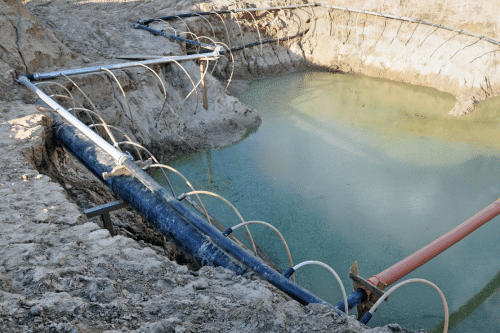Frequently asked questions about ground dewatering

Ground dewatering is a process of removing groundwater from a construction site or excavation area. This process is essential to maintain a stable and safe work environment, prevent soil erosion and minimize the risk of structural damage. In this article, we will answer some frequently asked questions about ground dewatering.
- What is ground dewatering? Ground dewatering is a process of removing groundwater from a construction site or excavation area. This is done to maintain a stable and safe work environment, prevent soil erosion, and minimize the risk of structural damage.
- Why is ground dewatering necessary? Groundwater can pose a significant risk to construction projects, causing soil erosion, unstable ground conditions, and damage to structures. Ground dewatering helps to maintain a stable and safe work environment by removing excess groundwater from the site.
- What are the different methods of ground dewatering? There are several methods of ground dewatering, including wellpoint dewatering, deep well dewatering, and sump pumping. The method used depends on the specific needs of the project and the site conditions.
- What is wellpoint dewatering? Wellpoint dewatering is a method of ground dewatering that involves the installation of a series of wellpoints around the perimeter of the excavation area. These wellpoints are connected to a vacuum pump that removes groundwater from the soil.
- What is deep well dewatering? Deep well dewatering is a method of ground dewatering that involves the installation of a series of deep wells around the perimeter of the excavation area. These wells are connected to a pump that removes groundwater from the soil.
- What is sump pumping? Sump pumping is a method of ground dewatering that involves the installation of a sump pump in the excavation area. This pump removes groundwater from the sump pit and discharges it to a suitable location.
- How is the groundwater disposed of? Groundwater removed during dewatering is typically disposed of in accordance with local regulations. In some cases, the water may be treated and discharged to a surface water body, while in other cases, it may be disposed of in a sanitary sewer system or transported off-site for treatment and disposal.
- How long does the dewatering process take? The duration of the dewatering process depends on several factors, including the size of the excavation area, the depth of the excavation, and the method of dewatering used. In general, dewatering can take anywhere from a few days to several weeks or months.
- How much does ground dewatering cost? The cost of ground dewatering varies depending on the size of the excavation area, the depth of the excavation, and the method of dewatering used. Other factors that can affect the cost include the type of soil and groundwater conditions at the site.
- How do I know if I need ground dewatering? If you are planning a construction project or excavation in an area with a high water table, you may need to consider ground dewatering. Signs that you may need dewatering include water pooling on the surface, unstable ground conditions, and difficulty excavating the site.
Speak to our team about ground dewatering services
Ground dewatering is an essential process for construction projects and excavations in areas with a high water table. By understanding the methods of ground dewatering, how groundwater is disposed of, and the factors that affect the cost and duration of the process, you can ensure that your project is safe, stable, and successful.
If you would like to know more about our ground dewatering services, do not hesitate to get in touch with our experienced team. We operate throughout the UK and have an experienced and professional team. We specialise in construction and ground dewatering, so you can feel confident when working with us.
To speak with our team simply fill in our contact form and we will be in touch as soon as possible.
